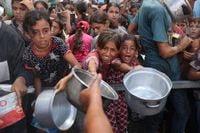On August 23, 2025, the United Nations Relief and Works Agency for Palestine Refugees (UNRWA) issued a stark warning to the world: famine in Gaza City, and potentially across the entire Gaza Strip, could be stopped—if only Israel would allow the immediate entry of desperately needed humanitarian aid. The agency, which has long served as a lifeline for Palestinians, confirmed that its warehouses in Jordan and Egypt are fully stocked with food, medicine, and health supplies, and that it stands ready to fill 6,000 trucks with these essentials for urgent delivery to Gaza.
UNRWA’s message, posted on its official X (formerly Twitter) account and echoed in statements to media outlets, was clear and urgent. “Famine in Gaza City can be stopped. Reverse the ongoing catastrophe—flood Gaza with a massive scale up of aid through the United Nations including UNRWA. … There is enough food, medicines and hygiene supplies ready to fill 6,000 trucks. The State of Israel must let us bring aid into Gaza,” the agency declared, as reported by The Guardian.
This call comes in the wake of a grim milestone. On August 22, 2025, United Nations and international experts officially declared the widespread outbreak of famine in Gaza, marking the first such announcement of famine in the Middle East. The UN-backed Integrated Food Security Phase Classification (IPC) confirmed that the famine is “entirely man-made,” warning of an exponential increase in deaths if conditions continue to deteriorate. According to the IPC, famine conditions are projected to spread from Gaza Governorate to Deir Al Balah and Khan Younis Governorates in the coming weeks, threatening even more lives.
UN Secretary-General Antonio Guterres did not mince words when addressing the crisis. “It is a man-made disaster, a moral indictment—and a failure of humanity itself. Famine is not about food; it is the deliberate collapse of the systems needed for human survival,” Guterres said, as highlighted by Cairo 23 August 2025. The UN chief’s remarks underscored the growing consensus among international agencies: the catastrophe in Gaza is not an accident of nature, but the result of deliberate policy choices and prolonged conflict.
UNRWA’s media advisor, Adnan Abu Hasna, emphasized the severity of the situation in an interview with Al Mamlaka, stating that the number of deaths due to malnutrition is “much higher than the reported figure.” Since October 2023, deaths from malnutrition have risen to 272, including 113 children, according to joint statements from the World Health Organization (WHO), the United Nations Children’s Fund (UNICEF), the World Food Programme (WFP), and the Food and Agriculture Organization (FAO).
The numbers are staggering. Since the start of the Israeli blockade and intensified bombardment on October 7, 2023, 62,263 people have been killed and 157,365 injured in Gaza, as reported by UN agencies. The blockade has closed crossings to aid trucks, leaving supplies piled up at the borders while the population inside faces escalating hunger-related deaths, rapidly worsening levels of acute malnutrition, and plummeting food consumption. According to the UN, over half a million people in Gaza are now trapped in a state of famine, with hundreds of thousands going days without anything to eat.
UNRWA’s repeated appeals highlight a logistical paradox: while famine and starvation grip Gaza, mountains of aid sit idle just across the border. “Our warehouses alone in Jordan and Egypt are full. There is enough food, medicines and hygiene supplies ready to fill 6,000 trucks,” the agency reiterated in a tweet, as covered by Ammon News. Yet, without Israeli approval to open the crossings, this lifeline remains out of reach for those who need it most.
International organizations have joined UNRWA in calling for urgent action. In a joint statement from Geneva, WHO, UNICEF, WFP, and FAO warned that the window to prevent further catastrophe is closing fast. They called on Israel to ensure the unobstructed delivery of food and medical supplies to the population, stressing that only a massive, immediate influx of aid can reduce deaths caused by hunger and malnutrition. “Stopping the current catastrophe requires bringing massive amounts of aid into Gaza through the United Nations, including UNRWA,” the agency insisted.
The situation has also drawn sharp commentary from humanitarian leaders. UN Secretary-General Guterres’s assertion that the famine represents a “failure of humanity itself” has resonated widely, prompting renewed debate over the responsibilities of the international community and the parties to the conflict. The United Nations and its agencies have consistently highlighted the extreme urgency of delivering immediate and full-scale humanitarian aid, given the escalating crisis and the dire projections for the weeks ahead.
For many observers, the tragedy unfolding in Gaza is a textbook example of how politics and conflict can override basic human needs. The blockade, intensified since October 2023, has not only closed the crossings to aid but has also been accompanied by heavy bombardment across all areas of the Strip. The combined effect has been to collapse the systems needed for human survival, as Guterres put it, leaving the civilian population exposed to hunger, disease, and death on a scale rarely seen in recent history.
Despite the grim statistics and the dire warnings from experts, hope persists that decisive action could turn the tide. UNRWA and its partners maintain that the famine can be stopped if Israel allows the immediate and large-scale entry of humanitarian aid. The agency’s readiness to mobilize 6,000 trucks loaded with life-saving supplies stands as a testament to what could be achieved—if only the political will exists to open the crossings and let the aid in.
As the international community grapples with the implications of the first officially declared famine in the Middle East, the people of Gaza wait—trapped between warehouses full of aid and the closed gates that prevent its delivery. The choices made in the coming days and weeks will determine whether this crisis deepens into an even greater tragedy or whether the world can muster the resolve to reverse what the UN has called a “man-made disaster.”
The stakes could not be higher for Gaza’s civilians. With every day that passes, the urgency mounts, and the world watches to see if the blockade will be lifted before it’s too late.





